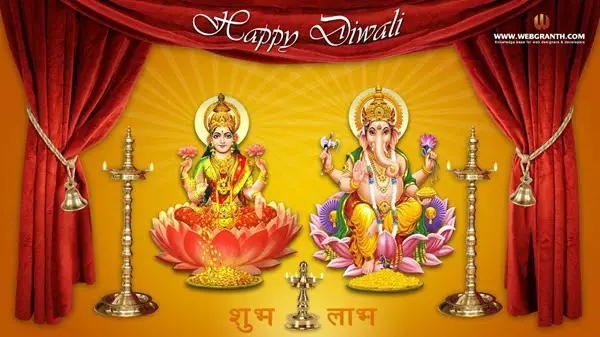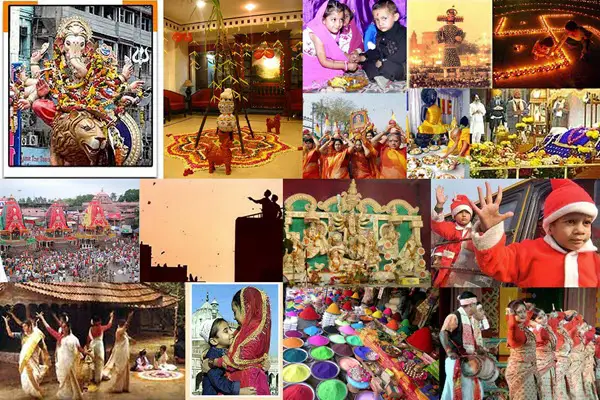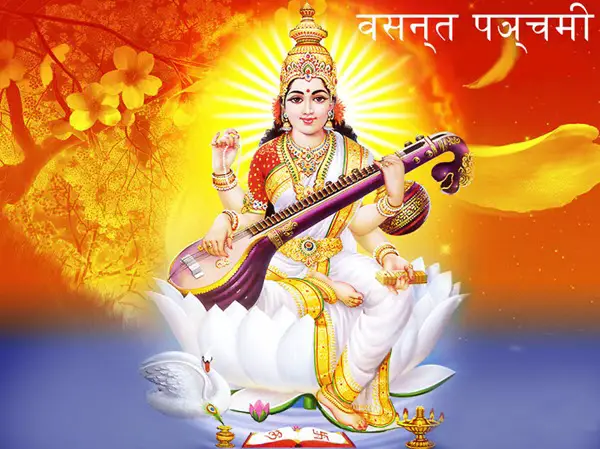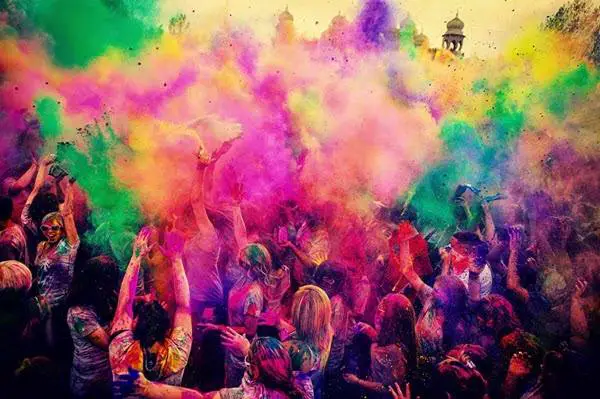Ugadi or Yugadi is celebrated as New Year’s Day in the Indian states of Andra Pradesh, Telangana, and Karnataka. It’s a Telugu as well as Kannada New Year Festival.
In Andhra Pradesh and Telangana, the term Ugadi is used, while in Karnataka, the term Yugadi is used for the festival.
Ugadi is a major festival of the Hindus and is celebrated with much pomp and fanfare. The festival is celebrated on the first day of the Hindu month of Chaitra, which typically falls in March or April. Thus, the festival of Ugadi is celebrated as per the lunisolar calendar.
Ugadi is celebrated in Maharashtra as Gudi Padwa. Ugadi also symbolizes the beginning of Chaitra Navratri which leads up to Ram Navami.

Table of Contents
Why do we Celebrate Ugadi?
The day holds special importance for the Hindus as it is believed that Lord Brahma created the Universe on this very day.
The word “Ugadi” is taken from the Sanskrit words “Yug,” which means era, and “Aadi,” which means beginning. So, Ugadi marks the beginning of a new era. In fact, in the Hindu religion, there is a cycle of 60 years. Ugadi means the beginning of a New Year or “Samvatsar.”
Moreover, Ugadi specifically refers to the Kaliyuga in which the current generation lives. According to Hindu religious texts, Ugadi is also referred to as “Chaitra Suddha Paadyami.”
The day is considered highly auspicious to start new ventures. It is said to bring good luck, wealth, and prosperity to people. Ugadi or Yugadi also marks the onset of spring and the harvest season. The festival signifies prosperity and well-being; it begins the onset of a new era.
Hindus worship Lord Brahma on this day as it is believed that He created the Universe on this very day. Lord Vishnu is also worshiped on this day as He is believed to be the creator of the “Yugas.”
What do we do in Ugadi?
Ugadi is observed by drawing colorful patterns on the floor known as “Kolamulus.” In Telugu, it is known as “Muggulu,” and in Kannada, it is known as “Rangoli.” People decorate the doors with mango leaves called “Torana” or “Toranalu.”
People buy gifts such as new clothes. They give charity to the poor. On this day, people take a special bath followed by an oil treatment. They visit Hindu Temples and worship Lord Vishnu.
They prepare a special food known as “Pachadi.” It is a festive food that combines all flavors such as sweet, sour, salty, and bitter. It is a symbolic reminder and means that one must welcome all flavors of experience in the coming year and make the most of them.
People wake up early in the morning. They take ritual showers and rub their body with perfumed oil. They offer prayers to the Lord.
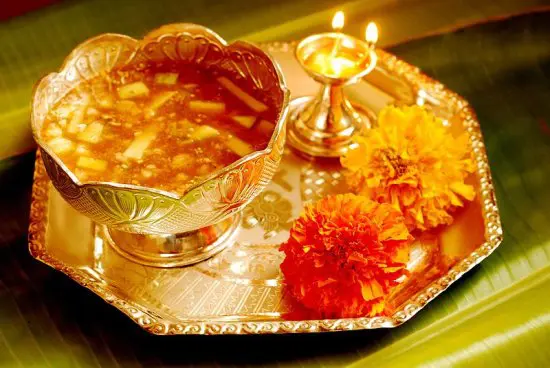
However, preparations for the festival begin almost a week ahead. Houses are thoroughly cleaned. People buy new clothes and items for the festival. They decorate the entrance of their houses using fresh mango leaves.
Mango leaves and coconuts hold special importance in the Hindu tradition, so they are used on Ugadi. People apply Cow dung paste in front of their houses and draw colorful floral designs. People visit temples and offer prayers to the Lord.
So, Ugadi is celebrated with religious zeal and social merriment.
Special dishes are prepared on the day of Ugadi. In Andhra Pradesh and Telangana, preparations such as pulihora, bobbatlu, and Pachadi go well with the occasion.
In Karnataka, a special dish is prepared using Jaggery and neem flower buds and eaten after the Puja, but before lunch. It is called bevu-bella and is indicative that life will be a mixture of sweetness and bitterness.
A Sanskrit Slokam that highlights the neem’s medicinal and spiritual importance is also chanted while having this sweet-bitter mixture.
This Sanskrit Slokam is as follows:
“शतायुर्वज्रदेहाय सर्वसंपत्कराय च ।
सर्वारिष्टविनाशाय निम्बकं दलभक्षणम् ॥”
Meaning: For attaining a diamond-like strong body that lasts a hundred years, for obtaining all kinds of wealth, and for destroying all negativity, one should consume or eat the neem leaves.
Another popular practice associated with Yugadi in Karnataka is the worship and reading of the New Panchang for the upcoming year.
It is called “Panchang Shravana.”
The Panchang lists out the fortune of the individuals as per their astrological signs, the rainfall for the year, eclipses that may happen in the year, and a general prediction related to the country’s affairs.
How do we Celebrate Ugadi?
Preparations for the festival begin well before Chaitra. People thoroughly clean and whitewash their homes. Temples and deity rooms in the houses are decorated with jasmine flowers and mango leaves.
The celebrations begin early in the morning. People wake up before dawn. They take a head bath after massaging their body with sesame oil. They wear new and traditional clothes.
The idols of Gods and Goddesses (within the house) are thoroughly cleaned and bathed in oil. People offer neem flowers, mango, and tamarind to the idols of Gods and Goddesses. They follow the tradition of offering prayers to the Gods and Goddesses.
There is a popular custom wherein senior women in the family apply oil and vermillion to the younger members’ foreheads. Then, all the members of the family see their reflection in a vessel full of molten ghee.
People worship the Panchang, and it is read before the members of the family. According to popular belief, special blessings are bestowed on all those who read and listen to the Panchang. People give gifts (such as new clothes) to the temple priest, or whosoever is reading the Panchang.
The “Indra Dhwaja” is worshiped. It is meant to bring abundant rainfall. The Indra Dhwaja is also a feature of Maharashtra’s New Year known as Gudi Padwa.
People decorate their front door with a string of mango leaves. They also decorate their entrance with Rangoli using a white chalk and colored powder.
Special food items are made on this festive occasion, such as Bevu Bella and Pachadi. It mixes Neem flowers or buds, green chilies, salt, Jaggery, tamarind juice, and unripened mangoes. It symbolizes happy, sad, and surprising moments in life.
The preparations are first offered to the Gods before the family eats them. People visit temples and offer prayers. They celebrate with family and friends.
In Karnataka, people buy new clothes and ornaments for this day.
Traditionally, men wear a white or off-white linen shirt and a cotton lungi. Men also adorn the “Angavastram” (a rectangular cloth of similar color and embellishment). They also wear a Gold chain and a Gold wristwatch.
Women wear brocade sarees in rich colors made with Bangalore silk or Kanjivaram. They adorn their hair with jasmine flowers. They also wear jewelry such as Gold necklaces, earrings, and bangles.
The young girls dress up in silk lehenga cholis. They complete the ensemble with strings of jasmine flowers in the hair. They also wear jewelry such as pearl necklaces, maang tikkas, and Gold earrings.
Ugadi Date 2024
Ugadi is regarded as the first day of the New Year, celebrated by Andhra Pradesh, Telangana, and Karnataka. So, Ugadi Festival is the Telugu New Year.
Ugadi will be celebrated on 9th April 2024, Tuesday.
The timing of the Ugadi festival is as follows:
Ugadi Tithi Begins: 11:50 PM on 8th April 2024
Ugadi Tithi Ends: at 08:30 PM on 9th April 2024
We wish all our readers,
!! A Very Happy Ugadi !!

